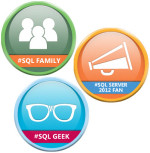 Dev Nambi (b|t) is hosting this month’s T-SQL Tuesday blog party. The party was started by Adam Machanic (b|t) in December of 2009. This month’s invitation is on the topic of Assumptions. Dev gave some great examples for possible T-SQL Tuesday posts with Assumptions as the focus. Here is the invitation:
Dev Nambi (b|t) is hosting this month’s T-SQL Tuesday blog party. The party was started by Adam Machanic (b|t) in December of 2009. This month’s invitation is on the topic of Assumptions. Dev gave some great examples for possible T-SQL Tuesday posts with Assumptions as the focus. Here is the invitation:
For this T-SQL Tuesday, the topic is assumptions. For example:
- The sun will come up tomorrow.
- Firewalls and anti-virus are enough to protect my computer.
- My backups work even if I don’t restore them.
- I don’t need to check for that error, it’ll never happen.
Your assignment for this month is to write about a big assumption you encounter at work, one that people are uncomfortable talking about. Every team has an elephant in the room.
This is a great topic, but I want to take this in another direction. I want to talk about the assumptions that should be stated at the beginning of a project.
In the Beginning
When we start a new project, we are given requirements. You might be laughing at me and saying, “Mickey, I’m never given proper requirements. I just get an email with a couple of sentences or I’m told verbally what to go do.” Well, while I agree that an email or a verbal assignment is a crappy way to be given requirements, if that is what you have, then that is what you have.
The good news is, you don’t have to leave it at that. No matter how bad of a writer you think you are, if you can expand on what little information you are given, then you will be better off in the end. And this is where assumptions come in.
| Assumption Dictionary.com 1. something taken for granted; a supposition: a correct assumption. Synonyms: presupposition; hypothesis, conjecture, guess, postulate, theory. 4. the act of taking possession of something: the assumption of power. Synonyms: seizure, appropriation, usurpation, arrogation. |
Covering your behind with assumptions
Whenever I’m given an assignment, whether it is in a full blown requirements document (angels get their wings when this happens), or when I’m given some vague guidelines, I always create additional documentation. Sometimes this documentation is for me. Sometimes it is for my teammates. Sometimes it is used only as a discussion point in a meeting. No matter who the documentation is for, I always include a section called Assumptions. This section is at the beginning of the document and it lists all the elephants in the room that no one wants to look at. Sometimes these elephants are actually really drunk. (Those also get listed under a different section called Risks.)
You should list all the various pieces of information that you think are important, but are missing from what you were given. This information could be facts that you need, such as all dates will be based on UTC time. Or it could be tasks such as a new web service needs to be built by another team.
Some of your assumptions might be wrong. That is not a bad thing to have happen. If you hadn’t listed XYZ as an assumption and you coded to XYZ, then more time will need to be taken to fix your work, or worse, XYZ ends up in production. By having your incorrect assumption listed and corrected, you now know more information about your project.
Some of your assumptions will take the project owner by surprise. This is also not a bad thing to have happen. It means that you have information they were not aware of. It could also mean that they didn’t think the project all the way through. Either way they now have information they didn’t have before.
By listing out all the missing pieces of information and tasks that need to be accomplished to make your project successful, you are shedding light on the entire scope of the project. You are taking control by assuming ownership of your situation and helping the end result of the project to be a successful one.
| NOTE: There is one type of document that I don’t include an Assumptions section in and that is for my SSRS Reports. Those requirements are gathered using a template so that all the answers I need are not missed. For me, this is my only exception. |
Thanks for all the fish
Thanks go out to Dev Nambi for hosting this month’s T-SQL Tuesday blog party. Please visit his website at http://devnambi.com.







